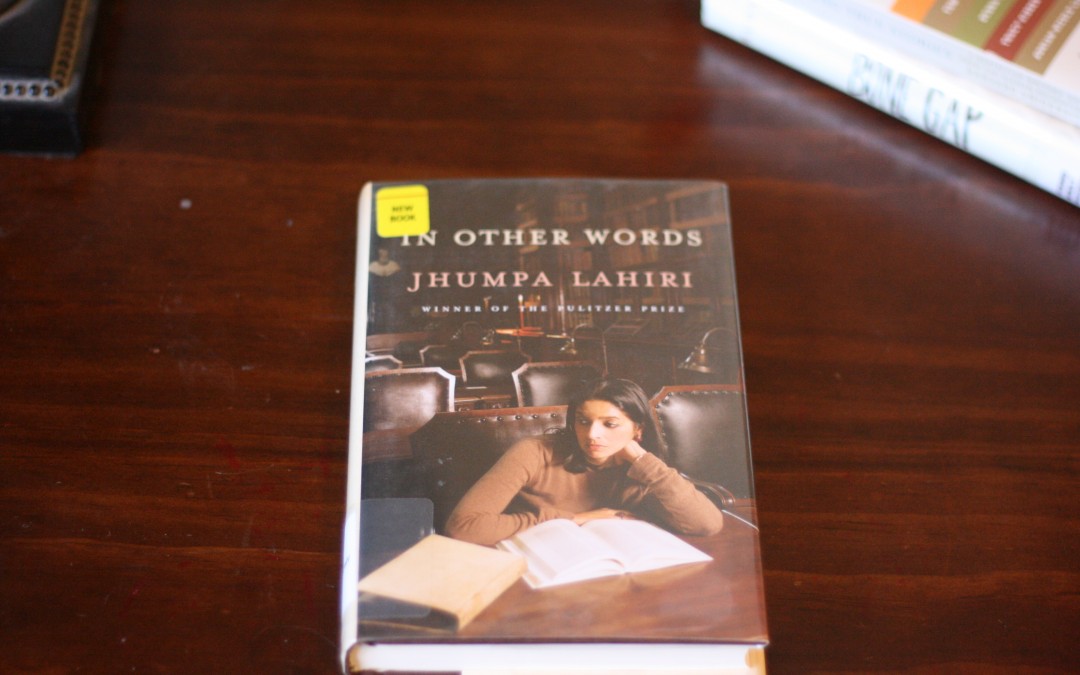I read a wide variety of books, if you haven’t quite picked that up yet. Today I want to tell you about two essay collections I really, really enjoyed.
The first was Jhumpa Lahiri’s In Other Words, which is a collection of essays that form the story of Lahiri’s journey into the Italian language. Her passion for the language and her drive to learn it moved her and her family to Rome for an immersion into the language. She begins the book by saying that she studied Italian after a trip to Florence in college. But she had never achieved mastery of the language. She’d never been able to let that go.
In Rome, Lahiri began to read and write—at first in her private journals, but later in short stories and essays—only in Italian. In Other Words is an autobiographical work that she wrote completely in Italian, so it is, at its heart, a story of one woman’s love and passion for a foreign language that culminated into a greater understanding of words.
But it’s not just Lahiri’s story about learning another language. It’s also a story about trying to find a place to fit in between cultures and selves. It is a masterful self-reflection on the art of reinvention.
Lahiri has a very poetic style, which made the essays flow smoothly and beautifully from one to another. Those who know Lahiri and her work will find this book different from her other books—but no less brilliant. She is one of my favorite short story writers, but now she has become one of my favorite essayists. The difference can be explained by her mastery of the Italian language. She wrote the book entirely in Italian and had someone else translate it into English—which gives the book a richer, deeper tone and voice and lyricism. Her writing is wise and truthful and lovely.
The second essay collection was not so much an essay collection as it was a diary. The Folded Clock, by Heidi Julavits was an intimate look into a regular woman’s year—or two. Julavits chronicled her daily life—but it wasn’t mundane or ridiculous. In fact, there were times that I laughed out loud and times that I got a little lump in my throat and times when I shook my head and said, “Yeah, me too.” Julavits talked about anxiety and women in writing and youth and aging and children and marriage. She wrote with intelligence, humor and, above all, deep honesty. She wrote about her struggles and about her silent thoughts and about her irrational worries that were so much like my own irrational worries. She framed the everyday with eloquent observations that spoke to the larger realm of life. It was charming and entertaining.
Some people might say that something as self-focused as a diary has no value at all. But Julavits proves this is not the case. She lays out her day-to-day activities but frames them within a larger context, and this is where the value in a diary is found. She doesn’t just report about what she did in the day, although each diary entry began with the same words, “Today I” but she takes her readers on a meandering path through her brain. What does it mean that she fought with her husband about his new diet? What does it mean that she does not like that particular coworker? What does it mean that she fears her daughter’s death when she hears an ambulance in her normally quiet neighborhood? And because she brings meaning to all of this, her readers not only connect with her everyday activities, but they connect to her musings.
My favorite parts of this book were the ones where Julavits talked honestly about the realities of parenting, but I also really enjoyed the courage it took to showcase fights with her husband and blunders she herself had made.
To demonstrate for you how Julavits took a situation and broadened its meaning, here’s an excerpt from the very beginning of the book:
“Today I wondered What is the worth of a day? Once, a day was long. It was bright and then it wasn’t, meals happened, and school happened, and sports practice, maybe, happened, and two days from this day there would be a test, or an English paper would be due, or there would be a party for which I’d been waiting, it would seem, for years. Days were ages. Love bloomed and died in a day. Rages flared and were forgotten and replaced by new rages, also forgotten. Within a day there were discernible hours, and clocks with hands that ticked out each new minute. I would think, Will this day never end? By nightfall, I’d feel like a war had been fought. I was wounded; sleep was not enough to heal me. Days would linger in my nerves, aftershocks registered on the electrical plain. Days made a physical impact. Days could hurt.”
I hope you enjoyed these book recommendations. Be sure to pick up a free book from my starter library and visit my recommends page to see some of my favorite books. If you have any books you recently read that you think I’d enjoy, contact me. I always enjoy adding to my list. Even if I never get through it all.


